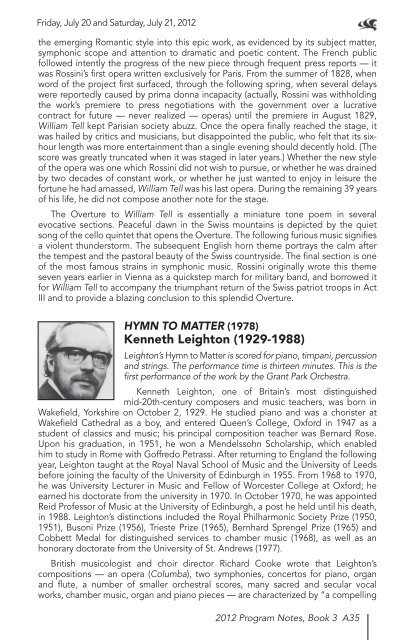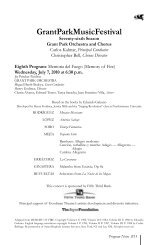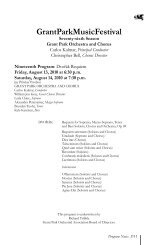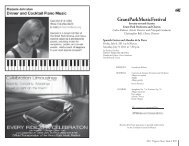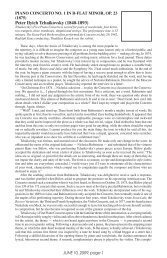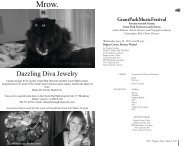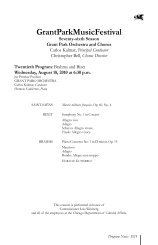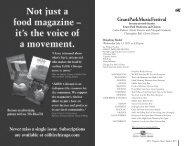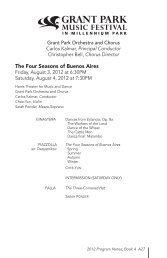rossini's Stabat Mater - The Grant Park Music Festival
rossini's Stabat Mater - The Grant Park Music Festival
rossini's Stabat Mater - The Grant Park Music Festival
You also want an ePaper? Increase the reach of your titles
YUMPU automatically turns print PDFs into web optimized ePapers that Google loves.
Friday, July 20 and Saturday, July 21, 2012<br />
the emerging Romantic style into this epic work, as evidenced by its subject matter,<br />
symphonic scope and attention to dramatic and poetic content. <strong>The</strong> French public<br />
followed intently the progress of the new piece through frequent press reports — it<br />
was Rossini’s first opera written exclusively for Paris. From the summer of 1828, when<br />
word of the project first surfaced, through the following spring, when several delays<br />
were reportedly caused by prima donna incapacity (actually, Rossini was withholding<br />
the work’s premiere to press negotiations with the government over a lucrative<br />
contract for future — never realized — operas) until the premiere in August 1829,<br />
William Tell kept Parisian society abuzz. Once the opera finally reached the stage, it<br />
was hailed by critics and musicians, but disappointed the public, who felt that its sixhour<br />
length was more entertainment than a single evening should decently hold. (<strong>The</strong><br />
score was greatly truncated when it was staged in later years.) Whether the new style<br />
of the opera was one which Rossini did not wish to pursue, or whether he was drained<br />
by two decades of constant work, or whether he just wanted to enjoy in leisure the<br />
fortune he had amassed, William Tell was his last opera. During the remaining 39 years<br />
of his life, he did not compose another note for the stage.<br />
<strong>The</strong> Overture to William Tell is essentially a miniature tone poem in several<br />
evocative sections. Peaceful dawn in the Swiss mountains is depicted by the quiet<br />
song of the cello quintet that opens the Overture. <strong>The</strong> following furious music signifies<br />
a violent thunderstorm. <strong>The</strong> subsequent English horn theme portrays the calm after<br />
the tempest and the pastoral beauty of the Swiss countryside. <strong>The</strong> final section is one<br />
of the most famous strains in symphonic music. Rossini originally wrote this theme<br />
seven years earlier in Vienna as a quickstep march for military band, and borrowed it<br />
for William Tell to accompany the triumphant return of the Swiss patriot troops in Act<br />
III and to provide a blazing conclusion to this splendid Overture.<br />
Hymn to Matter (1978)<br />
Kenneth Leighton (1929-1988)<br />
Leighton’s Hymn to Matter is scored for piano, timpani, percussion<br />
and strings. <strong>The</strong> performance time is thirteen minutes. This is the<br />
first performance of the work by the <strong>Grant</strong> <strong>Park</strong> Orchestra.<br />
Kenneth Leighton, one of Britain’s most distinguished<br />
mid-20th-century composers and music teachers, was born in<br />
Wakefield, Yorkshire on October 2, 1929. He studied piano and was a chorister at<br />
Wakefield Cathedral as a boy, and entered Queen’s College, Oxford in 1947 as a<br />
student of classics and music; his principal composition teacher was Bernard Rose.<br />
Upon his graduation, in 1951, he won a Mendelssohn Scholarship, which enabled<br />
him to study in Rome with Goffredo Petrassi. After returning to England the following<br />
year, Leighton taught at the Royal Naval School of <strong>Music</strong> and the University of Leeds<br />
before joining the faculty of the University of Edinburgh in 1955. From 1968 to 1970,<br />
he was University Lecturer in <strong>Music</strong> and Fellow of Worcester College at Oxford; he<br />
earned his doctorate from the university in 1970. In October 1970, he was appointed<br />
Reid Professor of <strong>Music</strong> at the University of Edinburgh, a post he held until his death,<br />
in 1988. Leighton’s distinctions included the Royal Philharmonic Society Prize (1950,<br />
1951), Busoni Prize (1956), Trieste Prize (1965), Bernhard Sprengel Prize (1965) and<br />
Cobbett Medal for distinguished services to chamber music (1968), as well as an<br />
honorary doctorate from the University of St. Andrews (1977).<br />
British musicologist and choir director Richard Cooke wrote that Leighton’s<br />
compositions — an opera (Columba), two symphonies, concertos for piano, organ<br />
and flute, a number of smaller orchestral scores, many sacred and secular vocal<br />
works, chamber music, organ and piano pieces — are characterized by “a compelling<br />
2012 Program Notes, Book 3 A35


